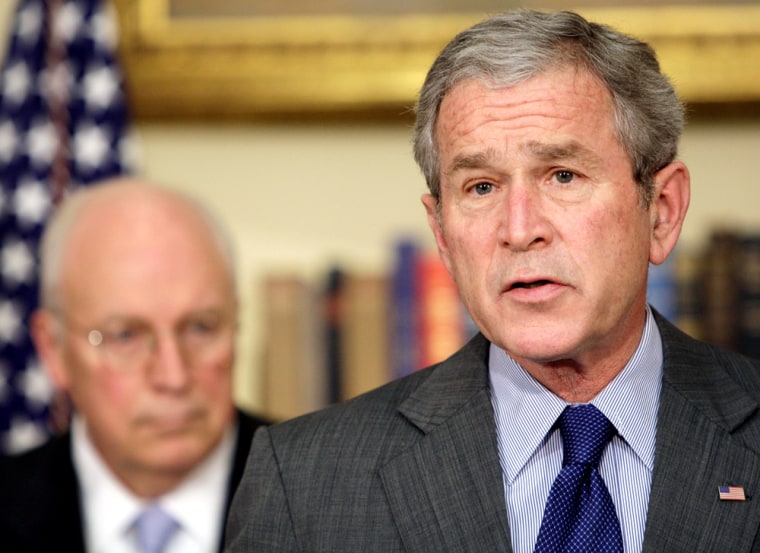President Bush, unpopular nationally but still a fundraising force, is ready to put the power of the White House behind the Republican nominee for president. Exactly what his role will be is a trickier matter.
What's clear for now is that Bush, in the last of his eight years in office, is preparing to be deferential. In reality, and by tradition, this is not his race to run.
Despite Sen. John McCain's clear front-runner status, don't expect Bush to break his relative silence for a while. The White House is waiting until a candidate either clinches the nomination or emerges as the last man standing because of withdrawals by the other candidates.
Either way, clarity could take several more weeks. And even then, a burst of activity by Bush is unlikely.
"There is kind of a reset button in which the nominee reintroduces himself to the public. And it's going to be important for the president and the White House to let him do just that," said Dan Bartlett, Bush's former counselor and a key aide during Bush's campaigns for Texas governor and president.
"That definitional period is so significant, and the president is such a big gun to associate yourself with," Bartlett said. "So I wouldn't expect a big bear hug."
Presidential advantage
When Bush does get actively engaged, he has tools to influence the campaign that no one else can wield.
Bush can issue executive orders and promote policies that put his party in a good light. He can zoom into town on Air Force One and raise huge amounts of money for his party. And he has a Cabinet stocked with surrogates who can visit targeted states and congressional districts to dole out grants.
"They can put their thumb on the scale," said John Podesta, who was chief of staff to Bill Clinton for the last part of the Democrat's two-term presidency. "That doesn't buy you 5 points in the polls, but if it's a very tight race - a repeat of 2000 or 2004 - that can be a big difference."
No decision has been made about which tactics Bush will use, said a Republican official who is familiar with the White House's thinking.
"It's our nominee's campaign, and how they choose to run it is up to them," said the official, who spoke on condition of anonymity to talk candidly about Republican strategy. Speaking of Bush, he said, "Candidates that want him, and need him, he'll be there."
McCain or Romney?
Much will depend, naturally, on the nominee.
McCain emerged from Super Tuesday with nearly 60 percent of the 1,191 delegates needed to win the nomination. His closest competitors, former Massachusetts Gov. Mitt Romney and former Arkansas Gov. Mike Huckabee, are trailing considerably but vowing to keep going.
Bush and McCain have a complicated relationship. The two had an intense, bitter primary fight in 2000, when McCain first ran for president. McCain was even wooed by Democratic Sen. John Kerry of Massachusetts - Bush's rival in 2004 - as a potential running mate. The Arizona senator twice voted against Bush's tax cuts and was a major critic of Bush's war management.
Yet McCain has also campaigned hard for Bush and backed him on key matters, including Bush's current Iraq strategy and his attempt to overhaul immigration policy. Republican officials who have watched Bush and McCain together say the two are allies, and that the sour chapter of 2000 is in the past.
Campaigning from a distance
Several political scientists said the eventual GOP nominee won't stage many events with Bush to ensure his own identity and to avoid linkage to an unpopular president. But people close to Bush say that angle is overblown. As they see it, none of the candidates has taken huge steps to distance himself from Bush.
Bush's role will also be shaped by his own busy schedule. He has seven more foreign trips this year, including one every month from April through August.
Podesta, now president of the Center for American Progress, said Bush's best chance to help his party's nominee may be by scoring a foreign policy victory. That could generate late optimism in the party that could carry over to the nominee.
"If he can actually deliver and bring home a Middle East peace agreement, if he listens to certain voices at the Pentagon that say we need to keep the troop withdrawals going (from Iraq), those are the kinds of things that can make a difference," Podesta said.
Bush's approval rating is low among the broad public, but he remains popular among many party insiders. And they pay to get in a room with him.
Fundraiser in chief
In 2007, Bush raised $66.3 million for the Republican Party and its candidates, according to the Republican National Committee. In five fundraising events last week, Bush raised more than $5 million. Republicans are "fortunate to benefit" from those kind of resources, RNC spokesman Brian Walton said.
The money is essential. It ends up supporting such activities as get-out-the-vote drives, which in turn help the Republican presidential nominee.
And Bush genuinely enjoys campaigning.
"Bush could make it easy by saying to the nominee, 'Anything we can throw your way fine, but we won't step on your campaigning,'" said Fred Greenstein, professor emeritus of politics at Princeton University. "He could conceivably just meet with the nominee and make it clear that his ego isn't in the way. And as long as the nominee doesn't literally run against him, Bush will do what he can to be useful."
